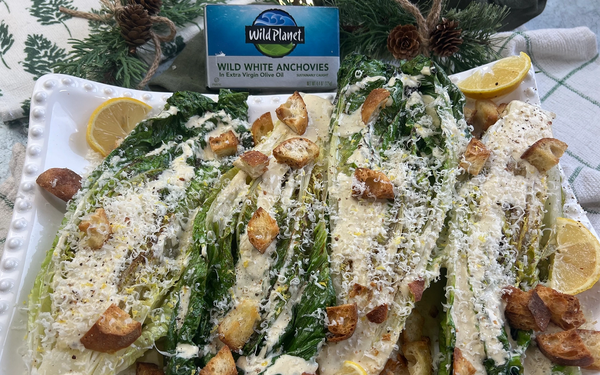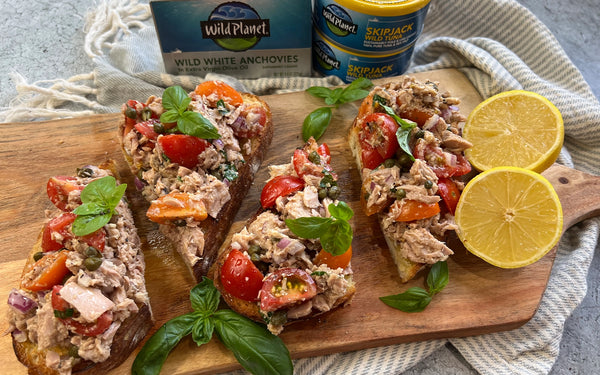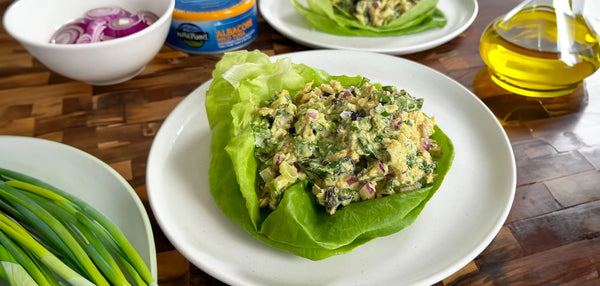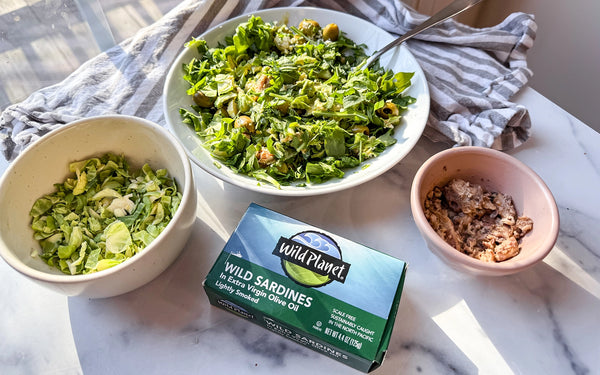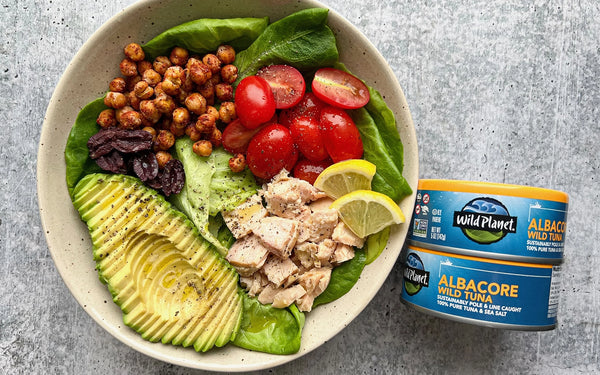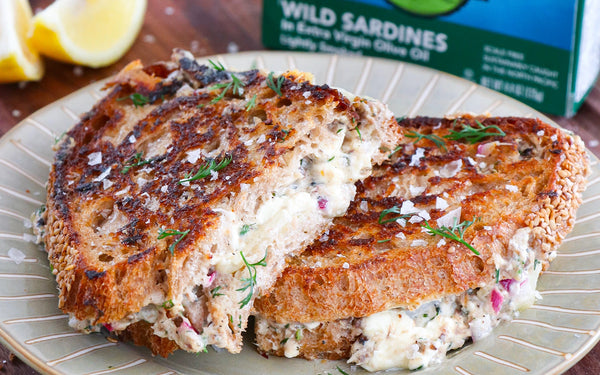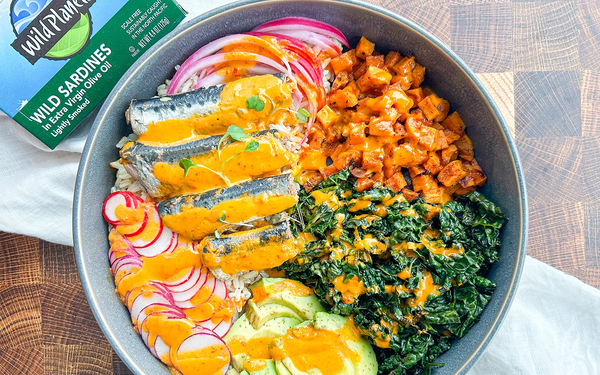 Since 1980, fish consumption has increased 20% within the United States alone. Although it’s exciting more people are welcoming fish to their plates and their palates, it also means it has become more difficult to keep track of the fish industry and their fishing practices. Here at Wild Planet Foods we believe in sustainable fishing practices and that responsible fishing supports global food security. As New Year’s Day nears and we all look to the future and what lies ahead, there’s no better time to adopt more sustainable practices in our lives. We've invited Ashley Martens, a Health and Wellness Writer of Three to Five a Day to share with us five simple ways to eat more sustainably in 2019.
Since 1980, fish consumption has increased 20% within the United States alone. Although it’s exciting more people are welcoming fish to their plates and their palates, it also means it has become more difficult to keep track of the fish industry and their fishing practices. Here at Wild Planet Foods we believe in sustainable fishing practices and that responsible fishing supports global food security. As New Year’s Day nears and we all look to the future and what lies ahead, there’s no better time to adopt more sustainable practices in our lives. We've invited Ashley Martens, a Health and Wellness Writer of Three to Five a Day to share with us five simple ways to eat more sustainably in 2019. 1. Shop for Smaller Fish  Larger fish like Ahi Tuna, King Mackerel and Swordfish tend to have higher levels of mercury and pollutants in their systems as these chemicals and foreign substances tend to accumulate and build up over time. Eating smaller seafood like anchovies, sardines and scallops are typically safer choices for both you and the environment. By easing up on the demand for larger fish, we essentially help decrease overfishing our oceans. If there is less demand, then that means there is less overfishing! Tip: It can be challenging for some to wrap their heads around eating smaller fish instead of larger fish, which are so often used as the main course in dinner dishes, but by diversifying the varieties of fish we eat, we may discover how delicious these smaller options of seafood can be! Need some culinary inspiration? Try canned sardines sautéed with capers, spinach and sun-dried tomatoes with a side of crusty bread or tossed together in a warm harvest bowl. Yum! Check out Wild Planet's website for more delicious recipes!
Larger fish like Ahi Tuna, King Mackerel and Swordfish tend to have higher levels of mercury and pollutants in their systems as these chemicals and foreign substances tend to accumulate and build up over time. Eating smaller seafood like anchovies, sardines and scallops are typically safer choices for both you and the environment. By easing up on the demand for larger fish, we essentially help decrease overfishing our oceans. If there is less demand, then that means there is less overfishing! Tip: It can be challenging for some to wrap their heads around eating smaller fish instead of larger fish, which are so often used as the main course in dinner dishes, but by diversifying the varieties of fish we eat, we may discover how delicious these smaller options of seafood can be! Need some culinary inspiration? Try canned sardines sautéed with capers, spinach and sun-dried tomatoes with a side of crusty bread or tossed together in a warm harvest bowl. Yum! Check out Wild Planet's website for more delicious recipes!  2. Avoid Shrimp
2. Avoid Shrimp
Although we are all for diversifying your diet with smaller fish, there is one seafood that should be avoided - shrimp. Wild shrimp are generally caught by net dragging in which giant nets are dragged across the bottom of the ocean floor. Ayana Elizabeth Johnson, Ph. D., and founder of Ocean Collectiv, reports that only about 10% of the content caught by these nets are actually shrimp. Everything else that is caught gets thrown back dead. “Shrimp is the most popular seafood in the United States and is also one of the most damaging to the oceans.” Instead of purchasing wild caught shrimp for your weekly shrimp tacos, mix it up and try something new instead like Wild Planet's Organic Roasted Chicken Breast.
3. Shop for Fish that Are Pole and Line Caught or Trolled
There are many ways to catch seafood. Some techniques only catch the intended species (i.e. pole and line fishing and trolling) while other methods tend to catch unintended species also referred to as bycatch. These fishing methods include purse seine fishing, long-line fishing and trawl fishing, which often results in injury and death to many innocent sea creatures. Wild Planet proudly endorses the two best practice fishing methods: pole fishing, line fishing and trolling. Both help sustain our oceans while simultaneously reducing bycatch.  Fact: Wild Planet has been ranked for several years in a row by Greenpeace as the #1 tuna brand for sustainability considerations.
Fact: Wild Planet has been ranked for several years in a row by Greenpeace as the #1 tuna brand for sustainability considerations.
4. Look for Labels
Fish fraud, is an all too common practice in the fishing industry. Fishermen who practice fish fraud intentionally mislabel fish in order to trick consumers into thinking they are getting something they are not. This tactic allows producers to increase their market prices and even sell fish that were caught illegally. Some of the most common mislabeled fish are grouper, halibut and mahi mahi. In order to protect yourself from fish fraud while simultaneously protecting the oceans from illegal fishing methods, you should eat locally caught, fresh fare—or purchase your seafood from a trusted source. 
5. Make Ocean Friendly Choices
When it comes to shopping for seafood, make ocean-friendly choices. Organizations like Monterey Bay Aquarium have created the Seafood Watch list where consumers can access consumer guides, find sustainable species and become a conscious consumer. You can even access their Seafood Watch App so you can research your purchases before making them.
Start Eating Sustainably Today
You don’t have to wait until the New Year to start eating more sustainably. Start today by incorporating these five easy steps. It’s better for you, the environment and most importantly the planet as a whole.  Learn more about Wild Planet Foods and their sustainability methods.
Learn more about Wild Planet Foods and their sustainability methods.


